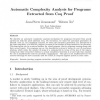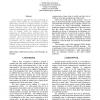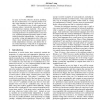587 search results - page 39 / 118 » On the Relative Sizes of Learnable Sets |
ENTCS
2006
13 years 8 months ago
2006
We describe an automatic complexity analysis mechanism for programs extracted from proofs carried out with the proof assistant Coq. By extraction, we mean the automatic generation...
ICRA
2003
IEEE
14 years 2 months ago
2003
IEEE
We present an approach that uses Q-learning on individual robotic agents, for coordinating a missiontasked team of robots in a complex scenario. To reduce the size of the state sp...
IJCAI
2007
13 years 10 months ago
2007
In many real-world collective decision problems, the set of alternatives is a Cartesian product of finite value domains for each of a given set of variables. The prohibitive size...
IJCAI
1989
13 years 9 months ago
1989
1 describe an approach to the problem of forming hypotheses about hidden mechanisms w; thin devices — the "black box" problem for physical systems. The approach involv...
EOR
2007
13 years 8 months ago
2007
The knapsack problem (KP) is generalized to the case where items are partially ordered through a set of precedence relations. As in ordinary KPs, each item is associated with pro�...



